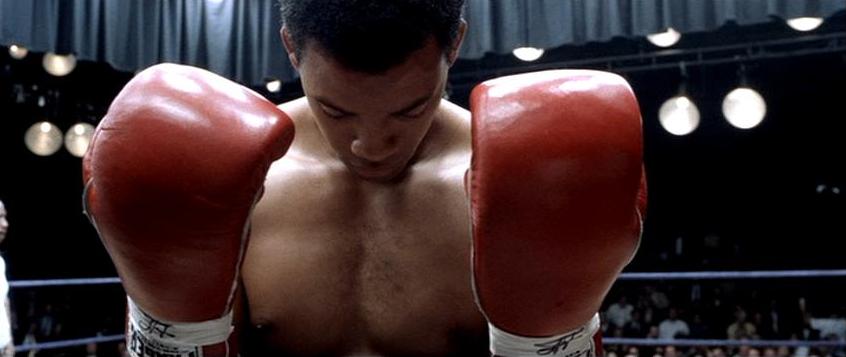

 |
 |
| Photo © 2001 Columbia Pictures |
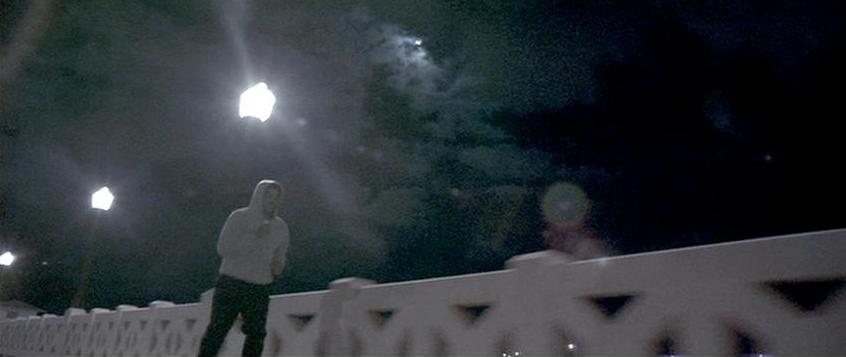 My overarching memory was of the movie solidly improving as it went, either because it starts out shaky in some demonstrable way and then gets tighter and
more affecting as it continues, or because I simply needed the first hour to acclimate to the hiccuping progress of the script and the peekaboo travels of
major characters in and out of the film. To me, on first viewing, the huge leap forward in Ali's emotional impact came with his second trip to Africa
for the Rumble in the Jungle, as he's dazzled by the scale and vehemence of his Zairean fans' admiration, and the film has the guts to match a career apex
(the fight) with a truly shifty personal move (the infidelity toward by far his most interesting wife, for which the film refuses to exonerate him). You
remembered him running in the cities back home in digital, and I remembered him running through Zaire with that flock of children and the same potent score.
But I'm no longer sure that Ali really makes a qualitative leap forward in its second half. I think I'm more receptive to its idiosyncrasies and its
formal experimentation all along than I was before, but my reaction to the finale was slightly more muted this time out. It's an odd bird, for sure, though
I shouldn't bury the lead—it's still my favorite Michael Mann movie. I know you won't sign on to a claim like that, but how enthusiastic are you feeling?
My overarching memory was of the movie solidly improving as it went, either because it starts out shaky in some demonstrable way and then gets tighter and
more affecting as it continues, or because I simply needed the first hour to acclimate to the hiccuping progress of the script and the peekaboo travels of
major characters in and out of the film. To me, on first viewing, the huge leap forward in Ali's emotional impact came with his second trip to Africa
for the Rumble in the Jungle, as he's dazzled by the scale and vehemence of his Zairean fans' admiration, and the film has the guts to match a career apex
(the fight) with a truly shifty personal move (the infidelity toward by far his most interesting wife, for which the film refuses to exonerate him). You
remembered him running in the cities back home in digital, and I remembered him running through Zaire with that flock of children and the same potent score.
But I'm no longer sure that Ali really makes a qualitative leap forward in its second half. I think I'm more receptive to its idiosyncrasies and its
formal experimentation all along than I was before, but my reaction to the finale was slightly more muted this time out. It's an odd bird, for sure, though
I shouldn't bury the lead—it's still my favorite Michael Mann movie. I know you won't sign on to a claim like that, but how enthusiastic are you feeling?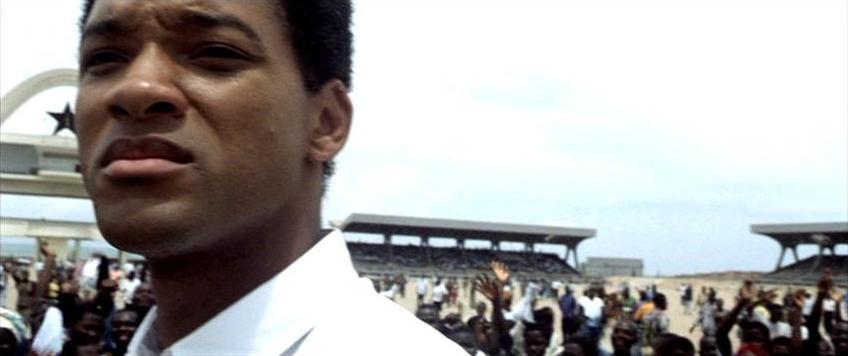 Then there's the frustration. I feel the film has more flow than shape, and I emerge, through no fault of the hard-working Smith, with my sense of Ali's
journey only marginally enriched or challenged. I guess I'd hate to impose some Spielbergian/Ron Howardy flashback structure to key it all in to the
final Foreman bout, but I'm sure it must have been a temptation—there's that moment a round in or so when Ali seems distracted by voices from the past,
and the cornball populist in me almost wants the entire movie to inhabit that little reflective pause, so we know where we are and where we're going, and
can work out what it means. That would be a boxing-movie cliché in itself, I realise, but boxing is a sport full of them, and I sometimes feel Mann's
shirking of the obvious has an almost pompously high-handed quality; it's no surprise to me that his film was a box-office underperformer. I think it could
have honoured Ali's charisma and achievement and got a little more unashamedly drunk on both those things—it's so sober! But then I'm back to the
gorgeous look and feel of it, and the moving commitment to Ali's global (not just American) importance as a black icon, and start to wonder if I'm
asking too much. It's hugely solid filmmaking. And for me, bang in the middle for Mann, a little below The Insider (which I
think I like more than you) and quite a bit above anything he's done since.
Then there's the frustration. I feel the film has more flow than shape, and I emerge, through no fault of the hard-working Smith, with my sense of Ali's
journey only marginally enriched or challenged. I guess I'd hate to impose some Spielbergian/Ron Howardy flashback structure to key it all in to the
final Foreman bout, but I'm sure it must have been a temptation—there's that moment a round in or so when Ali seems distracted by voices from the past,
and the cornball populist in me almost wants the entire movie to inhabit that little reflective pause, so we know where we are and where we're going, and
can work out what it means. That would be a boxing-movie cliché in itself, I realise, but boxing is a sport full of them, and I sometimes feel Mann's
shirking of the obvious has an almost pompously high-handed quality; it's no surprise to me that his film was a box-office underperformer. I think it could
have honoured Ali's charisma and achievement and got a little more unashamedly drunk on both those things—it's so sober! But then I'm back to the
gorgeous look and feel of it, and the moving commitment to Ali's global (not just American) importance as a black icon, and start to wonder if I'm
asking too much. It's hugely solid filmmaking. And for me, bang in the middle for Mann, a little below The Insider (which I
think I like more than you) and quite a bit above anything he's done since.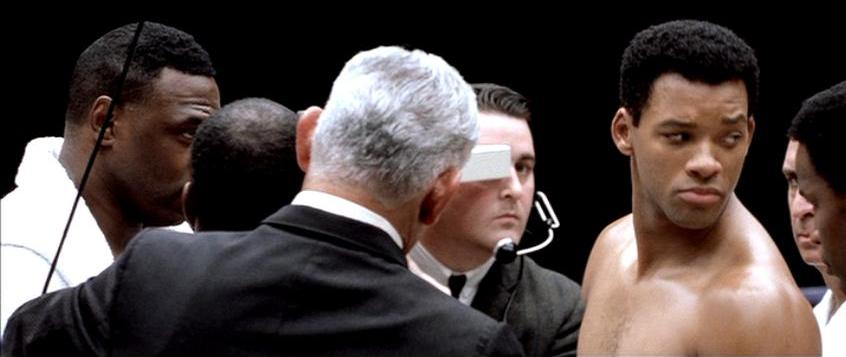 From the other angle, I like that Ali has so many cool but headstrong characters that Mann's laconic approach to feeling seems entirely apt, and since the
actors rarely aim for Big Emoting, and they aren't self-conscious of their own iconicity like the headlining pair in Heat, the
occasional impersonality and tough-minded affectations of the movie don't work against them. Of course, another way to put this is that I've rarely seen a
movie with this many characters—a reverential biopic, no less—where not a single character this side of Voight's Howard Cosell makes any explicit
bid toward being likable. Surely part of the "sober" vibe you refer to: these characters aren't nearly as interested in us as we are in them. A corollary
to this is that the movie's version of history isn't showboaty or self-conscious, either: the Rumble in the Jungle stands out as a moment when Ali
and his crew are aware of creating a kind of epochal moment, whereas the climactic Supreme Court decision in his favor is handled in such a defiantly offhanded
way. Even the editing of the scene where he refuses to answer his draft call is exemplary in this regard: Mann keeps the shot squarely on Will Smith's nearly
impassive face, rather than on his feet or on the literal line he's supposed to toe. You can't even judge, until the recruiting officer reacts, whether or
not he's done his duty. I'm not saying this penchant for visual and narrative obliquity always works in the movie's favor, or that their aren't some clunky
"time capsule" moments, as when Malcolm X explains to Ali/us that "Birmingham was important in the Civil Rights struggle," etc., etc. But the movie is, to
me, astonishingly distinctive in the way it handles even the most august moments in a very celebrated life in an oft-revisited moment in history. There's a
real payoff, which I don't see in Miami Vice or Public Enemies, to approaching the material in such a diagonal, restrained, unusual way.
From the other angle, I like that Ali has so many cool but headstrong characters that Mann's laconic approach to feeling seems entirely apt, and since the
actors rarely aim for Big Emoting, and they aren't self-conscious of their own iconicity like the headlining pair in Heat, the
occasional impersonality and tough-minded affectations of the movie don't work against them. Of course, another way to put this is that I've rarely seen a
movie with this many characters—a reverential biopic, no less—where not a single character this side of Voight's Howard Cosell makes any explicit
bid toward being likable. Surely part of the "sober" vibe you refer to: these characters aren't nearly as interested in us as we are in them. A corollary
to this is that the movie's version of history isn't showboaty or self-conscious, either: the Rumble in the Jungle stands out as a moment when Ali
and his crew are aware of creating a kind of epochal moment, whereas the climactic Supreme Court decision in his favor is handled in such a defiantly offhanded
way. Even the editing of the scene where he refuses to answer his draft call is exemplary in this regard: Mann keeps the shot squarely on Will Smith's nearly
impassive face, rather than on his feet or on the literal line he's supposed to toe. You can't even judge, until the recruiting officer reacts, whether or
not he's done his duty. I'm not saying this penchant for visual and narrative obliquity always works in the movie's favor, or that their aren't some clunky
"time capsule" moments, as when Malcolm X explains to Ali/us that "Birmingham was important in the Civil Rights struggle," etc., etc. But the movie is, to
me, astonishingly distinctive in the way it handles even the most august moments in a very celebrated life in an oft-revisited moment in history. There's a
real payoff, which I don't see in Miami Vice or Public Enemies, to approaching the material in such a diagonal, restrained, unusual way.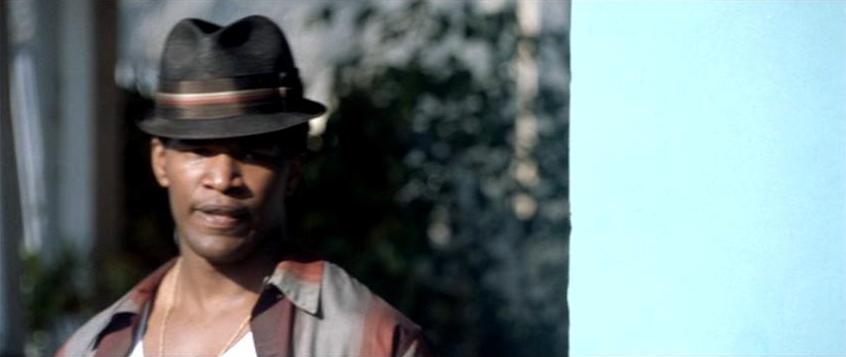 Isn't it a bit odd, for instance, that Mann makes so little of Ali's antagonists? It may not be a bad thing—perhaps it's a refreshing variation on his
usual pas de deux routine whereby the central figure is so consistently isolated, and finds himself casting off everyone from Malcolm X to his first
and second wives to Brown. Still, it's a pity that the one constant source of back-and-forth in his career, as presented here, had to be Voight's Cosell, a
party-trick routine I would find absolutely as hollow as I'd remembered it, were it not for a few deft moments of semi-improvised physical comedy. I have
no idea who Howard Cosell is or was beyond this movie, I'm afraid, which means he's eternally just that drawling guy with the toupee and bad putty nose and
inexplicable Oscar nomination. I'd have swiftly swapped Foxx in there, or even Mario Van Peebles, which is no huge compliment to his functional, TV-drama
impersonation, but it's still better than Voight's. Since it sounds like you place the movie's characterisation fairly high up its list of assets, do your
thoughts on these performances tally with mine? And what of Wright, Williamson, Silver, Pinkett? I might like the ensemble in The Insider fractionally
more, but it's close.
Isn't it a bit odd, for instance, that Mann makes so little of Ali's antagonists? It may not be a bad thing—perhaps it's a refreshing variation on his
usual pas de deux routine whereby the central figure is so consistently isolated, and finds himself casting off everyone from Malcolm X to his first
and second wives to Brown. Still, it's a pity that the one constant source of back-and-forth in his career, as presented here, had to be Voight's Cosell, a
party-trick routine I would find absolutely as hollow as I'd remembered it, were it not for a few deft moments of semi-improvised physical comedy. I have
no idea who Howard Cosell is or was beyond this movie, I'm afraid, which means he's eternally just that drawling guy with the toupee and bad putty nose and
inexplicable Oscar nomination. I'd have swiftly swapped Foxx in there, or even Mario Van Peebles, which is no huge compliment to his functional, TV-drama
impersonation, but it's still better than Voight's. Since it sounds like you place the movie's characterisation fairly high up its list of assets, do your
thoughts on these performances tally with mine? And what of Wright, Williamson, Silver, Pinkett? I might like the ensemble in The Insider fractionally
more, but it's close.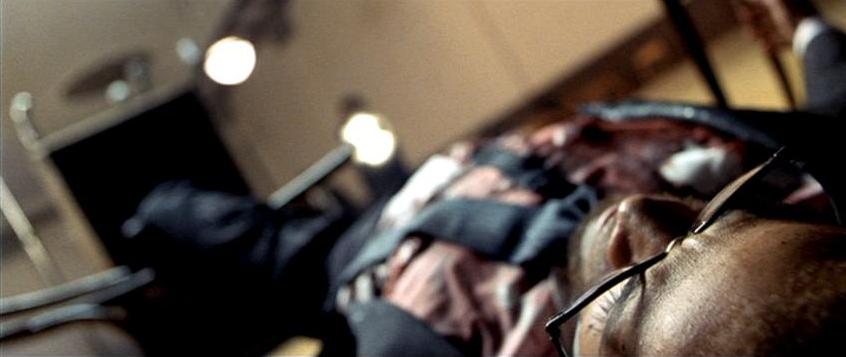 True that Ali keeps remarkably distant from Ali's boxing opponents, but I was much more troubled by its incredibly anxious handling of the Black
Nation of Islam. The script is obviously quite severe at their expense, with some justification, but does Mann really need to keep filming them as these
portentous, speechless phantoms of watchful menace? Add 'em all together, short of the reliably strong Barry Shabaka Henley, and you get Gale Sondergaard
in The Letter. Elsewhere in the cast, among the recognizable names, I think everyone deserves to feel proud, but I will never stop wondering why
Jeffrey Wright takes so, so, so, so many parts as the Opaque, Mercurial Bystander, and why Hollywood can't think of anything else to do with him, even after
his delicious villainy in Shaft. I would put the ensembles of Manhunter and The Insider comfortably above this one, but it's still a
high-caliber collection of performances.
True that Ali keeps remarkably distant from Ali's boxing opponents, but I was much more troubled by its incredibly anxious handling of the Black
Nation of Islam. The script is obviously quite severe at their expense, with some justification, but does Mann really need to keep filming them as these
portentous, speechless phantoms of watchful menace? Add 'em all together, short of the reliably strong Barry Shabaka Henley, and you get Gale Sondergaard
in The Letter. Elsewhere in the cast, among the recognizable names, I think everyone deserves to feel proud, but I will never stop wondering why
Jeffrey Wright takes so, so, so, so many parts as the Opaque, Mercurial Bystander, and why Hollywood can't think of anything else to do with him, even after
his delicious villainy in Shaft. I would put the ensembles of Manhunter and The Insider comfortably above this one, but it's still a
high-caliber collection of performances.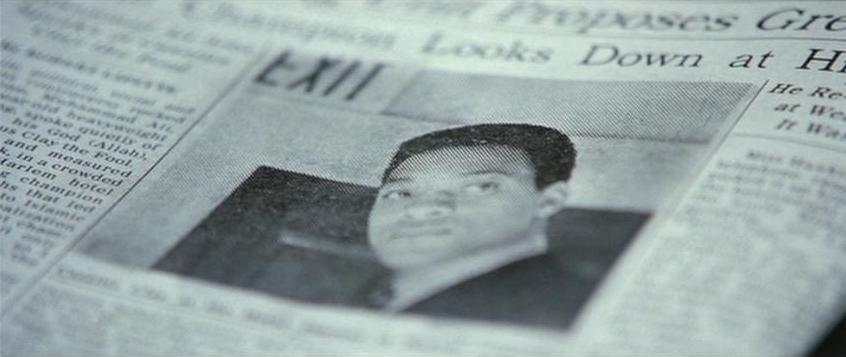 Mann so often romanticises his men going it alone, and there's a certain degree of this here, but the movie is subtle enough to grasp how Ali's personal
failures are of his own making, complicating his journey with all these dead ends of unfulfilment and damaged relationships. That's an amazingly mature
stance for a sports biopic to have, when you figure how many of them present a talented hero merely buffeted by and weathering these somewhat fakely externalised
slings and arrows—call it the "Shit Happens" school of oblivious hagiography. I can talk myself round to like the movie an awful lot when I consider
how intelligently it makes Ali himself, not some overdetermined framing device or even many newspaper headlines, into the motor who drives it through the
ups and downs. Somehow, I never quite love this approach in practice as much as I do in theory, and not nearly as much as a film like Capote,
which is so shrewd about exploring its not dissimilar psychology in one specific context. But I respect it a lot. So on a good day my wobbly enthusiasm might
float like a butterfly up to B+, but right now I guess it's stinging like a B.
Mann so often romanticises his men going it alone, and there's a certain degree of this here, but the movie is subtle enough to grasp how Ali's personal
failures are of his own making, complicating his journey with all these dead ends of unfulfilment and damaged relationships. That's an amazingly mature
stance for a sports biopic to have, when you figure how many of them present a talented hero merely buffeted by and weathering these somewhat fakely externalised
slings and arrows—call it the "Shit Happens" school of oblivious hagiography. I can talk myself round to like the movie an awful lot when I consider
how intelligently it makes Ali himself, not some overdetermined framing device or even many newspaper headlines, into the motor who drives it through the
ups and downs. Somehow, I never quite love this approach in practice as much as I do in theory, and not nearly as much as a film like Capote,
which is so shrewd about exploring its not dissimilar psychology in one specific context. But I respect it a lot. So on a good day my wobbly enthusiasm might
float like a butterfly up to B+, but right now I guess it's stinging like a B.| Academy Award Nominations: | |
| Best Actor: Will Smith | |
| Best Supporting Actor: Jon Voight | |
| Golden Globe Nominations: | |
| Best Actor (Drama): Will Smith | |
| Best Supporting Actor: Jon Voight | |
| Best Original Score: Lisa Gerrard & Pieter Bourke | |
| Permalink | Home | 2001 | ABC | Blog |